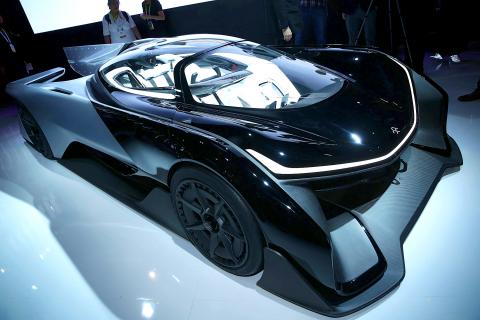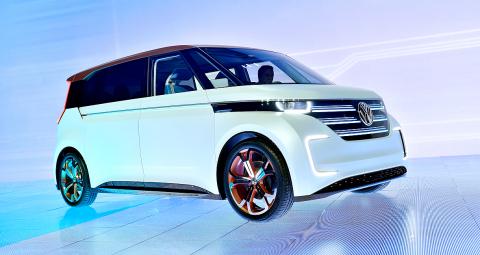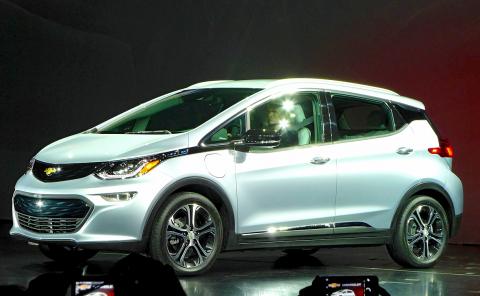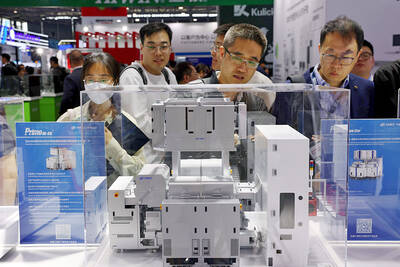Talk by automakers attending the Consumer Electronics Show (CES) this week in Vegas was nothing short of electric.
Ford Motor Co, General Motors Co (GM) and Volkswagen AG (VW) have made it clear they are betting on electric vehicles for the future, even though the segment is only a small sliver of the global industry.
Some of the vehicles unveiled at the Consumers Electronics Show have been concepts or prototypes, but GM displayed the final version of its Chevrolet Bolt, which aims to capture buyers who are interested in electric propulsion without the price tag of a Tesla.

Photo: AFP
However, the boldest statement came from California startup Faraday Future, which on Monday in Las Vegas unveiled its FFZERO1 concept car, resembling a Batmobile and touted as a game-changer in the industry.
The company, which has revealed little about its financial backing or management, has already said it would invest US$1 billion in a Nevada manufacturing plant and that it expects cars to be produced withing two years.
Volkswagen used CES to unveil its BUDD-e — a version of its hippie favorite Kombi minivan transformed into an electric, connected vehicle of the future.

Photo: AFP
The German automaker, hit by a global scandal over its diesel cars, said it expects the electric ones to be on the road by the end of the decade.
Ron Montoya of the auto research firm Edmunds.com said VW has a possible winner with the minibus.
“You can easily see that being a production car,” he said. “Not only would it be a very stylish car that a lot of people have emotional connections with, but it could be potentially one of the first [electric] minivans.”

Photo: AFP
In a move that could make electric cars affordable to a mass market, GM showed its definitive version of the Chevrolet Bolt and confirmed it would be in production later this year.
The Bolt is designed to travel 320km between charges, and it will cost less than US$30,000 after tax breaks, GM said.
It also features some of the connected technology found on rival vehicles, including a Wi-Fi hotspot offering access to apps and services.
“The Bolt EV [electric vehicle] is truly the first EV that cracks the code of long range and affordable price,” GM chief executive Mary Barra told a CES forum.
Meanwhile, Ford reaffirmed its plan to invest US$3.5 billion over the next five years in electric car development, with a goal of producing 13 new EV or hybrid vehicles by 2020.
Several other automakers are also committed to electric, and some see the segment gaining traction, even though electrics only represented 0.08 percent of the global auto fleet at the end of 2014.
There are signs consumers are warming to EVs. In Norway, for example, one out of every five cars registered last year was electric.
“EVs will play a bigger role in the automotive future — there’s little question about that,” Kelley Blue Book analyst Akshay Anand said. “The Bolt is a big step simply because of its price and range.”
However, Anand said there is still some reluctance.
Lower fuel prices have reduced the sense of urgency and “most consumers want an EV as a primary vehicle, so range and charging time are critical factors,” Anand said.
One company that has had success in some respects is Tesla, whose highly regarded electric vehicles have become a hit.
However, its price tag has been too high for the general public.
Faraday Future and others have hinted about a new ownership model, raising the prospect of plans that allow consumers to get a car as needed without a hefty commitment.
This takes on a new perspective if cars become autonomous.
“VW hinted that cars might become ‘devices’ at some point in the future,” Anand said. “The social aspect of a car is bizarre to think about, but it could very well happen down the road.”

With this year’s Semicon Taiwan trade show set to kick off on Wednesday, market attention has turned to the mass production of advanced packaging technologies and capacity expansion in Taiwan and the US. With traditional scaling reaching physical limits, heterogeneous integration and packaging technologies have emerged as key solutions. Surging demand for artificial intelligence (AI), high-performance computing (HPC) and high-bandwidth memory (HBM) chips has put technologies such as chip-on-wafer-on-substrate (CoWoS), integrated fan-out (InFO), system on integrated chips (SoIC), 3D IC and fan-out panel-level packaging (FOPLP) at the center of semiconductor innovation, making them a major focus at this year’s trade show, according

DEBUT: The trade show is to feature 17 national pavilions, a new high for the event, including from Canada, Costa Rica, Lithuania, Sweden and Vietnam for the first time The Semicon Taiwan trade show, which opens on Wednesday, is expected to see a new high in the number of exhibitors and visitors from around the world, said its organizer, SEMI, which has described the annual event as the “Olympics of the semiconductor industry.” SEMI, which represents companies in the electronics manufacturing and design supply chain, and touts the annual exhibition as the most influential semiconductor trade show in the world, said more than 1,200 enterprises from 56 countries are to showcase their innovations across more than 4,100 booths, and that the event could attract 100,000 visitors. This year’s event features 17

Germany is to establish its first-ever national pavilion at Semicon Taiwan, which starts tomorrow in Taipei, as the country looks to raise its profile and deepen semiconductor ties with Taiwan as global chip demand accelerates. Martin Mayer, a semiconductor investment expert at Germany Trade & Invest (GTAI), Germany’s international economic promotion agency, said before leaving for Taiwan that the nation is a crucial partner in developing Germany’s semiconductor ecosystem. Germany’s debut at the international semiconductor exhibition in Taipei aims to “show presence” and signal its commitment to semiconductors, while building trust with Taiwanese companies, government and industry associations, he said. “The best outcome

Semiconductor equipment billings in Taiwan are expected to double this year, as manufacturers in the industry are keen to expand production to meet strong global demand for artificial intelligence applications, according to SEMI, which represents companies in the electronics manufacturing and design supply chain. Speaking at a news conference before the opening of Semicon Taiwan trade show tomorrow, SEMI director of industry research and statistics Clark Tseng (曾瑞榆) said semiconductor equipment billings in Taiwan are expected to grow by an annual 100 percent this year, beating an earlier estimate of 70 percent growth. He said that Taiwan received a boost from a